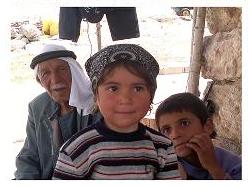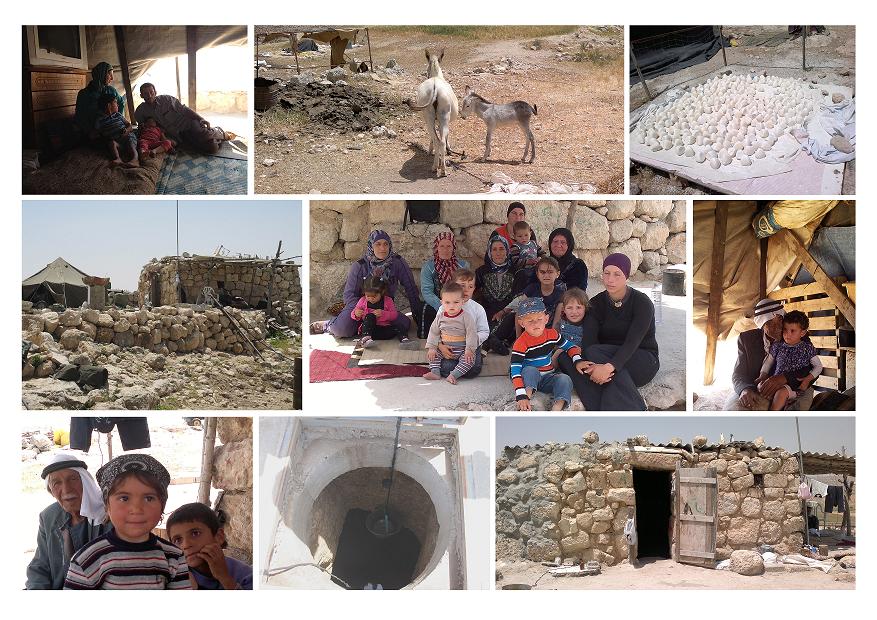
Summary
The High Court ruled on 27.9.2017 to erase ACRI’s petition from 2007 against demolitions in the village of Khirbat Zanuta in the South Hebron Hills. The High Court verdict concluded that the existing demolition orders against homes and structures in Zanuta village will not be carried out so long as the military is still deliberating introducing changes to its planning criteria in Area C. The verdict adds that there will be no enforcement of existing orders on condition that no new construction takes place.
Background
Khirbat Zanuta is a small Palestinian village in the southern hills of Hebron, whose 27 families earn their living by husbandry of sheep. The village has been settled for several generations, dating to a time well before Israel’s occupation of the West Bank in 1967. Historically the villagers lived in natural caves augmented by stone entryways, but sometime in the 1980’s, most of these caves became uninhabitable. The villagers now live in stone houses covered with tin and plastic roofs and in other temporary structures, and use the caves, along with external pens, to shelter their sheep.
In 2007, the Civil Administration issued demolition orders on the majority of the buildings in Zanuta. The State’s position is that the structures are illegal because they were built without permits (or subsequent variances). But there is no way the villagers could have received permits since there is no master plan for the village. The Civil Administration claims that there is no justification for a master plan that would incorporate Zanuta, citing, among other things, the village’s small size, the existence of archeological ruins on the premises, and the relatively long distance between the village and the town of Dahariya.
Most of Zanuta’s residents were born and raised in the village. Others were born in Dahariya and moved to the village when they entered the trades of animal husbandry. The demolition orders in question do not threaten a handful of structures but rather an entire village, and in broader terms – a traditional way of life.
Legal Proceedings
- In 2007, the Association for Civil Rights in Israel, on behalf of the village residents, petitioned the High Court for relief and the court issued a temporary restraining order.
- Last year, a Jewish expansionist organization named Regavim succeeded in reviving the case by filing an amicus-curia request; soon thereafter, the state submitted its full response to the petition.
- In April 2012, the Civil Administration issued additional demolition orders for new structures in the village, including several cisterns (ACRI is arguing that objections to the new orders should be joined to the original petition, but the Civil Administration disagrees).
- The Supreme Court heard additional arguments on July 30, 2012. During the hearing, the justices delivered harsh criticism of the State for its intent to demolish the village without suggesting a solution for its residents.
- Following a number of postponements, the court is due to convene again to discuss this matter on September 9, 2013.
- On January 18, 2017, a hearing was held on the case. At the beginning of the hearing, the respondents’ counsel submitted a statement that in recent months they were working on reexamining one of the planning criteria in the West Bank, a process that might favorably influence the decision not to plan the village of Zanuta. In return they asked the Court to delete the petition and allow them to demolish another part of the buildings in the village.
- On February 13, 2017, ACRI submitted its response to the State, objecting to the deletion of the petition.
- Following the State’s announcement in January 2017, the High Court decided on 27.9.2017 to delete the petition. The High Court verdict concluded that the existing demolition orders against homes and structures in Zanuta village will not be carried out so long as the military is still deliberating introducing changes to its planning criteria in Area C.
Unofficial translation of High Court verdict:
“In the State’s update from 18.1.2017 the State notified its intention to hold a discussion in the High Planning Council, which may have ramifications as to the possibility of regulating the cluster that is discussed in this petition.
“Following some deliberation, and given the State’s response, we wish to clarify that the orders against which this petition was submitted will not be enforced until a decision is made on the possibility of regulating this cluster; All this, under the condition that no new construction will be carried out in this site.
“If in the future a decision will be made to carry out the orders, the petitioners, through their lawyer, will be given early notification of at least 30 days.
“All the abovementioned does not relate to immediate military needs, if such needs arise.”
To read the High Court’s verdict in Hebrew, click here
Implications
The case of Zanuta is demonstrative of the Israeli government’s planning policy as it relates to the Palestinians in Area C, in which actions as severe as the destruction of basic humanitarian structures are justified by an absurd Catch 22 that penalizes residents for failing to apply for a permit they could never have been granted. If these demolition orders are carried out, the residents of Zanuta will be stripped of their most basic humanitarian rights: shelter, water, and livelihood, not to mention dignity, culture, and way of life. As an occupying power in Area C, Israel is bound by international law to protect the indigenous community. The case exemplifies a policy of demolishing buildings in Palestinian villages that removes indigenous peoples from their lands in absolute violation of the international law which protects them.
The next hearing before the High Court of Justice is scheduled for 9 September 2013.
Related Materials
The petition (in Hebrew). HCJ 9715/07
Further information on the High Court of Justice Hearing on July 30, 2012.
Below: Photos from Khirbat Zanuta (by Yafit Gamilah Biso, Nira Shalev, and Marc Grey).
Click on images to view full size.










3 Responses to Cancelling Demolition Orders in Area C Village (Khirbat Zanuta Petition)